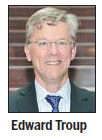A message from FTA chairman about the changing times
Like any good organization, tax authorities need to continually adapt to the times they are in.
The UK tax authority, HM Revenue and Customs, is modernizing the way it operates to meet the changing needs and expectations of UK taxpayers - and to maximize the tax revenue it brings in.
Over the next five years, HMRC is moving away from traditional, outdated ways of working to become smaller and more efficient, with a highly skilled workforce using cutting-edge digital technology. The plans are backed by government investment of 2.1 billion pounds ($3 billion).
Although HMRC was founded just over a decade ago, following the merger of the UK's Inland Revenue and Customs services, its work dates back 1,000 years to Anglo-Saxon England, when King Ethelred imposed the first land tax to fund the defense of England against the Vikings.
There has always been a strong sense of public duty among people who work for HMRC and its predecessors, and this is reflected today in the record revenue yields that HMRC delivers year-on-year.
Changing traditions
Despite this, HMRC's traditional ways of working no longer meet the complex requirements of today's taxpayers. It sent out 193 million letters and 330 million forms in 2012-13, despite the fact that people are increasingly doing everyday tasks online.
HMRC's traditional structures also don't make it easy enough for today's taxpayers to get their tax affairs right. They have often had to speak to many different parts of the organization to resolve different types of queries, because HMRC's internal structures were not joined in a helpful way.
That's why HMRC is modernizing to make the UK tax system more straightforward.
By making it easier for the honest majority of taxpayers to get their tax affairs right at an early stage, HMRC's tax professionals can focus their resources on the complex tax affairs of multinationals and wealthy individuals, and on the dishonest minority of tax avoiders and evaders.
Digital technology is at the heart of this modernization. HMRC recently launched new online tax accounts for more than 5 million businesses and 49 million individuals, which are revolutionizing the way the British public manage their tax affairs.
These accounts will enable taxpayers to see and manage all their tax affairs online in one place, similar to an online bank account.
Underlying these and other new digital services is HMRC's investment in data analytics. HMRC holds a huge amount of taxpayer data, but it hasn't always been held on a single system.
Now, that data is moving onto a single data hub that lets HMRC analyze information in completely new ways to identify risks and target noncompliance more accurately.
HMRC can also learn much more about individual taxpayers, so taxes can be calculated automatically, forms pre-filled, and checks built in to online processes to minimize error and fraud.
New ways of working
All this is backed up by changes to the way that HMRC and its employees work. Currently, HMRC's 56,000 employees work in 170 offices around the United Kingdom - a legacy from an era before computers, mobile phones and the internet, when people visited their local tax office to resolve problems. This makes it difficult for HMRC employees to modernize their ways of working.
So, over the next five years, HMRC is consolidating its estate into 13 new regional centers, allowing employees to work and train together.
This will improve performance and give taxpayers the modern services they expect, at a lower cost. HMRC is also investing in training and development, so employees have the multiple skills they need to use new technology and manage the risks and needs of specific customer groups.
The different strands of HMRC's modernization will only succeed if they all work together - and it is essential they do so in order for HMRC to continue delivering its vital role for the UK.
But tax administration in the 21st century cannot be just about reforms at home - in today's world, where international businesses conduct transactions across borders, it's vital that tax authorities cooperate internationally,
The global landscape is changing, and new technology is giving all countries the opportunity to change the way we work, learn from each other and exchange best practice.
This is important, not just to tackle international tax avoidance and evasion, but to enhance global prosperity and support economic development across the world.
HMRC hopes that the plenary in Beijing will be an important milestone in developing this international cooperation, so we can all better prepare and respond to emerging challenges.
The author is chairman of the Forum on Tax Administration and chief executive and permanent secretary of HM Revenue and Customs in the UK.

(China Daily 05/11/2016 page6)












